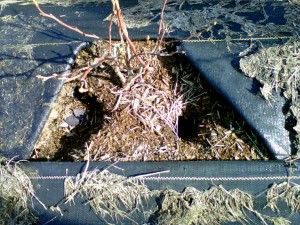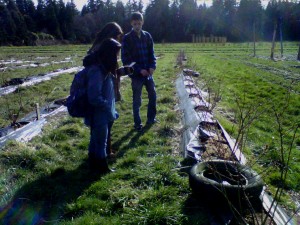Purpose
A group of students taking part in the APBI 260 course at the University of British Columbia show a keen interest in studying the effect of mulch used on blueberry bushes and what types of rodents it may attract. This study is important for the sake of the health of the blueberry fields to see whether or not the rodents have an effect on the production of blueberries at the UBC Farm.
The problem with voles in blueberry fields is that they have the tendency to chew on the plant roots which can damage the crowns, canes, and trunk of the blueberry tree (DeFrancesco and Murray, 2011). The presence of voles can be visibly noted by gnawing marks on the canes and roots and tunnels and holes amongst the blueberry rows (DeFrancesco and Murray, 2011). According to Berries Northwest (2011), reports that organically produced blueberries in Northern Washington had a major mouse and vole problem during the winter months, catching up to thousands of rodents.
The UBC Farm currently uses three different mulches in their blueberry field, and applies four different organic based fertilizers (Dr. D. McArthur, Personal Communication, March 1, 2012). The mulches used in the blueberry field at the UBC Farm consist of sawdust, city yard trimmings, and black plastic, and the fertilizers used include mow and blow, feather-meal, composted poultry-litter, and a control (Dr. D. McArthur, Personal Communication, March 1, 2012). The controlling of potential rodents is especially difficult due to the organic practices used at the UBC Farm. As stated by T.P. Sullivan (Personal Communication, March 1, 2012), rodents that may affect the blueberry bushes at the UBC Farm include Oregon, Long-tailed, and Townsend voles, Deer mice, Black and Roof rats, as well as shrews.
It is visible that the UBC Farm is currently experiencing a rodent issue within their blueberry fields, but the specific rodents have not been identified. The identification and numbers of rodents recorded will help the group analyze what rodents may be causing blueberry root damage and what types of mulches they may be attracted to. Since rodents in British Columbia are protected under the Wildlife Protection Act, the rodents must be captured in a humane fashion, the species identified, and released in a way in which has both the health of the animal and the health of the UBC farm blueberry plantation in mind (Ministry of Environment, 1994).
References
Berries Northwest. (2011). Small Fruit Update: Regional Reports. Retrieved from: http://www.berriesnw.com/SFU/2011/SFU03-08-11.pdf on March 1, 2012
DeFrancesco, J, and Murray, K. (2011). Pest Management Strategic Plan for Blueberries in Oregon and Washington. Retrieved from http://www.ipmcenters.org/pmsp/pdf/ORWABlueberry.pdf on March 29, 2012.
Ministry of Environment. (1994). Integrated Pest Management. Retrieved from http://www.env.gov.bc.ca/epd/ipmp/publications/brochures/rats_mice.htm on March 1st, 2012

